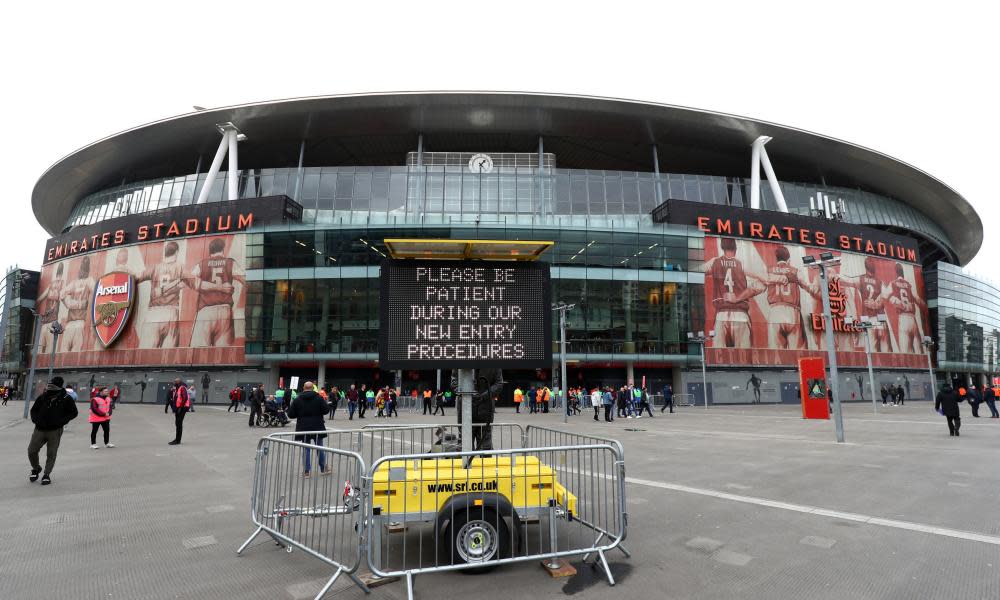Arsenal have passed on consequences wrought by a bloated sense of status

When Arsenal announced in April that the majority of their players and coaching staff had agreed to take wage cuts, a section of their statement shed telling light on the tone of the negotiations. “In these conversations there has been a clear appreciation of the gravity of the current situation caused by the Covid-19 pandemic and a strong desire for players and staff to show their backing for the Arsenal family,” it read.
The squad believed they would be helping to protect other employees, most of whom enjoy nothing like footballers’ levels of financial security, from being plunged into a job market whose brutality seems likely to be unmatched in modern times. So it is no surprise that eyebrows have been raised, to put it mildly, among Mikel Arteta’s players at the news on Wednesday that 55 redundancies are proposed across the club. The players can argue they have done their bit off the pitch – and on it to a certain extent, through winning the FA Cup and reaching the Europa League – and are entitled to question what has changed.
Related: Arsenal shed more scouts in break-up of their European network
That is particularly the case given, in April, Arsenal could foresee a certain degree of the medium-term hit they would take during the shutdown. They knew their matchday income, which was around £96m in the 2018-19 season, constituted a quarter of their revenue and that no other Premier League club could point to a similar reliance on that cash stream. With that, they were aware an extended period playing behind closed doors would be damaging.
While nobody knows how long it will be until the Emirates Stadium corporate suites are wining and dining again, there was never any serious suggestion they would be back by the start of next season. The hospitality department is one of several believed to be in line for cuts when the details are fine-tuned.
There is a point at which raking over knowns and unknowns becomes harsh: in a global pandemic of indeterminate length it is hard to plan with confidence. But club owners should be expected to take decisions responsibly and it is no surprise many feel that, in opting to cut around 10% of Arsenal’s permanent staff, the Kroenkes have sold theirs short.
The knife taken to the scouting department has occupied particular attention, and will apply to a number of the roles that are being discontinued. That may prove to be part of a longer-term plan, regardless of the logic and much as it is no comfort to anyone affected. But it is striking that, viewed en masse, these redundancies have no parallels among Arsenal’s peers and perhaps the more relevant question is how has it come to this.
In 2013, when Arsenal signed Mesut Özil, the then-chief executive Ivan Gazidis was moved to hail the “commercial capability of the club to deliver the consistent revenues and financial strength required to compete for the world’s best players”. It was a fair enough statement at the time, borne out by Özil’s arrival and the subsequent move for Alexis Sánchez, and came on the back of several years’ aggressive recruitment of sharp executives who could unlock vast international revenue streams.
For it to remain the case, though, Arsenal had to remain stable on the pitch. Instead they nosedived, a chaotic succession to Arsène Wenger and several backroom areas only exacerbating matters, while showing little genuine desire to cut their cloth. It is why Josh Kroenke admitted last year that they were running a “Champions League wage bill on a Europa League budget”, words uttered a fortnight before they spent a club record £72m in Nicolas Pépé.
David Luiz joined on £120,000-a-week wages seven days after that. Even after their worst league finish in 25 years, eighth place, they will soon sign Willian for a similar salary and then double that figure in, as seems increasingly likely, securing the future of Pierre-Emerick Aubameyang.
There seems little genuine appetite to scale back and it is worth remembering the brutal honesty with which Arteta addressed their plight in mid-July. “If you are not in the Champions League and you say: ‘OK, I don’t invest because I don’t have the financial ability to do it,’ but the others invest, then the gap becomes bigger,” he said, questioning whether Arsenal should “go for it” in order to make up the ground they have lost.
It was striking to read in the club statement on Wednesday the tone-deaf reassurance that roles were being cut “to enable us to continue to invest in the team”. The sentiment appeared troublingly populist; as if, when the dust has settled, a fan’s biggest care is the success of their side. While it is natural to seek improvement, that quest surely goes beyond the pale when it affects the livelihoods of hardworking employees.
That is the bind in which Arsenal have found themselves and it is hard to make a case that they have hit on the correct answer. Staff on five-figure salaries, many of them relatively low, will take the rap for an inability to accept reality that long predates coronavirus. In streamlining their numbers, the club pass on the consequences wrought by a bloated sense of self.
“Remember who you are, what you are and who you represent,” Ian Wright tweeted on Thursday, using a phrase associated with the late David Rocastle. Perhaps a similar utterance by the current squad would make the necessary impression during the 30-day consultation period that the proposed cuts will undergo; even if it does, Arsenal have no easy way out of a moral quandary that is ultimately of their own making.

 Yahoo News
Yahoo News 
